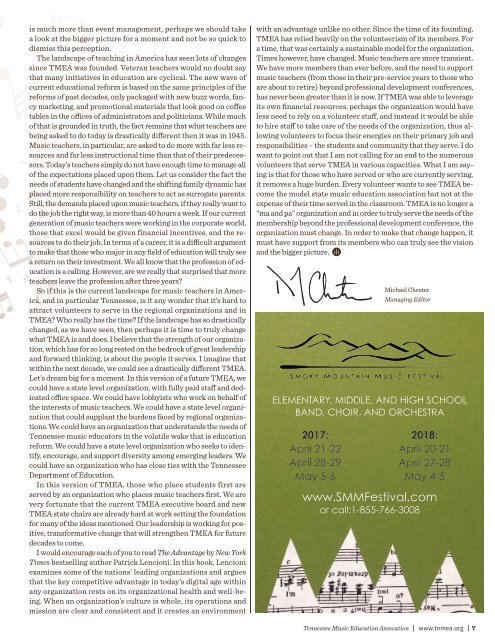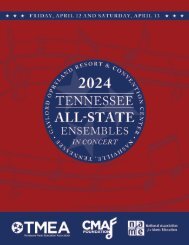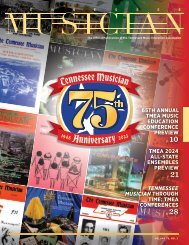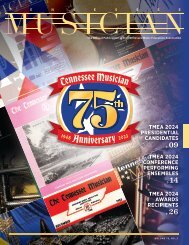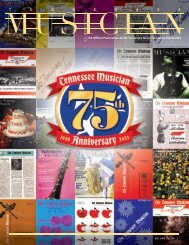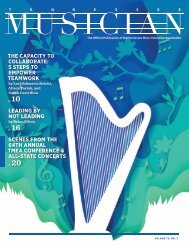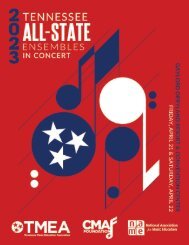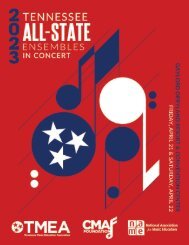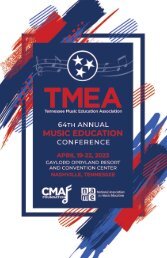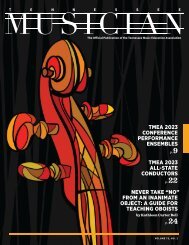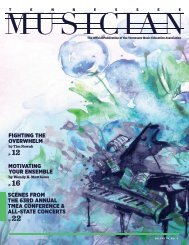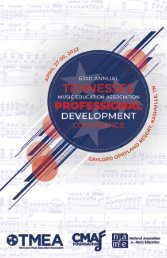You also want an ePaper? Increase the reach of your titles
YUMPU automatically turns print PDFs into web optimized ePapers that Google loves.
is much more than event management, perhaps we should take<br />
a look at the bigger picture for a moment and not be so quick to<br />
dismiss this perception.<br />
The landscape of teaching in America has seen lots of changes<br />
since TMEA was founded. Veteran teachers would no doubt say<br />
that many initiatives in education are cyclical. The new wave of<br />
current educational reform is based on the same principles of the<br />
reforms of past decades, only packaged with new buzz words, fancy<br />
marketing, and promotional materials that look good on coffee<br />
tables in the offices of administrators and politicians. While much<br />
of that is grounded in truth, the fact remains that what teachers are<br />
being asked to do today is drastically different then it was in 1945.<br />
Music teachers, in particular, are asked to do more with far less resources<br />
and far less instructional time than that of their predecessors.<br />
Today’s teachers simply do not have enough time to manage all<br />
of the expectations placed upon them. Let us consider the fact the<br />
needs of students have changed and the shifting family dynamic has<br />
placed more responsibility on teachers to act as surrogate parents.<br />
Still, the demands placed upon music teachers, if they really want to<br />
do the job the right way, is more than 40 hours a week. If our current<br />
generation of music teachers were working in the corporate world,<br />
those that excel would be given financial incentives, and the resources<br />
to do their job. In terms of a career, it is a difficult argument<br />
to make that those who major in any field of education will truly see<br />
a return on their investment. We all know that the profession of education<br />
is a calling. However, are we really that surprised that more<br />
teachers leave the profession after three years?<br />
So if this is the current landscape for music teachers in America,<br />
and in particular Tennessee, is it any wonder that it’s hard to<br />
attract volunteers to serve in the regional organizations and in<br />
TMEA? Who really has the time? If the landscape has so drastically<br />
changed, as we have seen, then perhaps it is time to truly change<br />
what TMEA is and does. I believe that the strength of our organization,<br />
which has for so long rested on the bedrock of great leadership<br />
and forward thinking, is about the people it serves. I imagine that<br />
within the next decade, we could see a drastically different TMEA.<br />
Let’s dream big for a moment. In this version of a future TMEA, we<br />
could have a state level organization, with fully paid staff and dedicated<br />
office space. We could have lobbyists who work on behalf of<br />
the interests of music teachers. We could have a state level organization<br />
that could supplant the burdens faced by regional organizations.<br />
We could have an organization that understands the needs of<br />
Tennessee music educators in the volatile wake that is education<br />
reform. We could have a state level organization who seeks to identify,<br />
encourage, and support diversity among emerging leaders. We<br />
could have an organization who has close ties with the Tennessee<br />
Department of Education.<br />
In this version of TMEA, those who place students first are<br />
served by an organization who places music teachers first. We are<br />
very fortunate that the current TMEA executive board and new<br />
TMEA state chairs are already hard at work setting the foundation<br />
for many of the ideas mentioned. Our leadership is working for positive,<br />
transformative change that will strengthen TMEA for future<br />
decades to come.<br />
I would encourage each of you to read The Advantage by New York<br />
Times bestselling author Patrick Lencioni. In this book, Lencioni<br />
examines some of the nations’ leading organizations and argues<br />
that the key competitive advantage in today’s digital age within<br />
any organization rests on its organizational health and well-being.<br />
When an organization’s culture is whole, its operations and<br />
mission are clear and consistent and it creates an environment<br />
with an advantage unlike no other. Since the time of its founding,<br />
TMEA has relied heavily on the volunteerism of its members. For<br />
a time, that was certainly a sustainable model for the organization.<br />
Times however, have changed. Music teachers are more transient.<br />
We have more members than ever before, and the need to support<br />
music teachers (from those in their pre-service years to those who<br />
are about to retire) beyond professional development conferences,<br />
has never been greater than it is now. If TMEA was able to leverage<br />
its own financial resources, perhaps the organization would have<br />
less need to rely on a volunteer staff, and instead it would be able<br />
to hire staff to take care of the needs of the organization, thus allowing<br />
volunteers to focus their energies on their primary job and<br />
responsibilities – the students and community that they serve. I do<br />
want to point out that I am not calling for an end to the numerous<br />
volunteers that serve TMEA in various capacities. What I am saying<br />
is that for those who have served or who are currently serving,<br />
it removes a huge burden. Every volunteer wants to see TMEA become<br />
the model state music education association but not at the<br />
expense of their time served in the classroom. TMEA is no longer a<br />
“ma and pa” organization and in order to truly serve the needs of the<br />
membership beyond the professional development conference, the<br />
organization must change. In order to make that change happen, it<br />
must have support from its members who can truly see the vision<br />
and the bigger picture.<br />
ELEMENTARY, MIDDLE, AND HIGH SCHOOL<br />
BAND, CHOIR, AND ORCHESTRA<br />
2017:<br />
April 21-22<br />
April 28-29<br />
May 5-6<br />
Michael Chester<br />
Managing Editor<br />
2018:<br />
April 20-21<br />
April 27-28<br />
May 4-5<br />
www.SMMFestival.com<br />
or call:1-855-766-3008<br />
Tennessee Music Education Assocation | www.tnmea.org | 7


